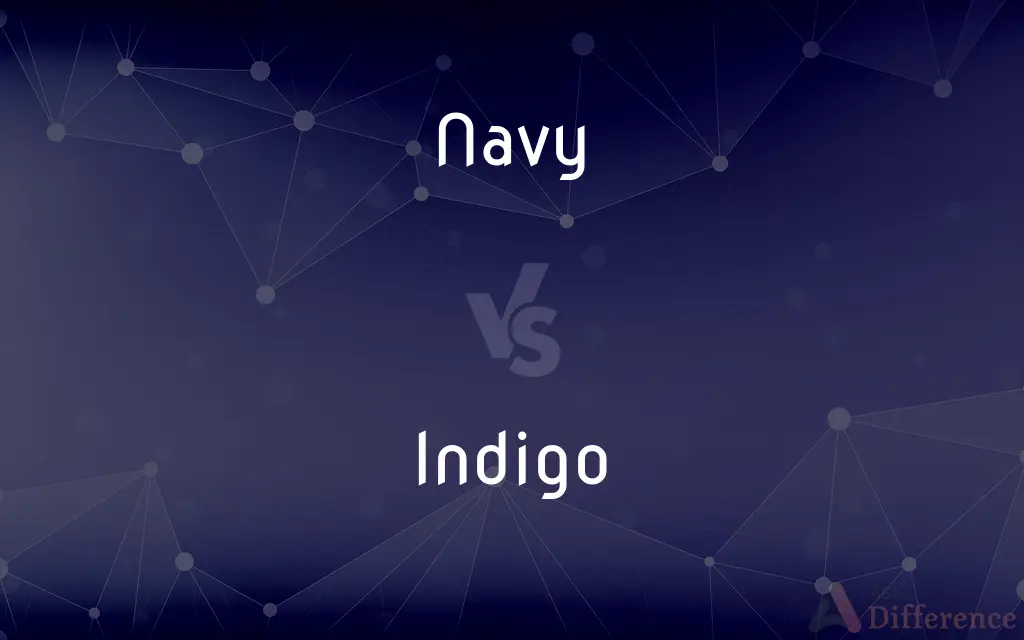Navy vs. Indigo — What's the Difference?
Edited by Tayyaba Rehman — By Urooj Arif — Updated on April 27, 2024
Navy is a deep, dark blue, often resembling black, while indigo is a brighter, more vibrant blue with violet undertones.

Difference Between Navy and Indigo
Table of Contents
ADVERTISEMENT
Key Differences
Navy is a very dark shade of blue, almost appearing black in low light, which makes it a popular choice for professional and formal attire. Indigo, on the other hand, has a more vivid and brighter appearance, featuring a blend of blue and violet, which makes it distinct and often used in artistic and decorative contexts.
Navy is traditionally associated with uniforms, especially those of naval officers, hence its name and widespread use in military and authoritative organizations. Indigo, whereas, has historical significance in dyeing and textiles, famous for its role in denim jeans, offering a rich and deep hue that fades beautifully with wear.
In terms of color psychology, navy conveys sophistication, power, and authority, making it a common choice in corporate environments. Indigo, on the other hand, is often associated with intuition, perception, and deeper thinking, lending itself well to creative industries.
When it comes to accessibility in design, navy is very versatile, providing excellent contrast against light colors, which is ideal for readability and visual ergonomics. Indigo, while also versatile, tends to stand out more due to its brightness and can be used effectively to attract attention or highlight important elements.
In fashion and interiors, navy offers a classic, timeless look, easily paired with a wide range of colors. Indigo, whereas, serves as a striking accent color, often used to inject personality and energy into spaces and outfits.
ADVERTISEMENT
Comparison Chart
Color Shade
Darker, closer to black
Brighter, with violet tones
Common Uses
Uniforms, formal wear
Jeans, artistic design
Color Psychology
Authority, professionalism
Intuition, creativity
Design Utility
High contrast, versatile
Eye-catching, vibrant
Fashion Impact
Classic and timeless
Bold and expressive
Compare with Definitions
Navy
Associated with conservatism and professionalism.
The company’s logo is navy to evoke reliability.
Indigo
Represents intuition and spiritual depth in color psychology.
She painted the room indigo to create a calming space.
Navy
Pertaining to the main color of naval uniforms.
His navy suit matched the formal atmosphere.
Indigo
Deep blue color with violet tones.
The sky at dusk turned a beautiful shade of indigo.
Navy
Deep, dark blue color, almost black.
The navy blazer was perfect for the evening event.
Indigo
Originally derived from the Indigofera plant for dyeing.
Indigo dye was historically valuable for trading.
Navy
Used to describe deep shades in design and fashion.
She chose navy curtains to complement the cream walls.
Indigo
Commonly used in the making of denim jeans.
His indigo jeans faded nicely with age.
Navy
Represents authority and trust in color psychology.
The navy banner stood out at the conference.
Indigo
Often used in art and decor for its vibrant hue.
The artist used indigo to highlight the painting’s theme.
Navy
A navy, naval force, or maritime force is the branch of a nation's armed forces principally designated for naval and amphibious warfare; namely, lake-borne, riverine, littoral, or ocean-borne combat operations and related functions. It includes anything conducted by surface ships, amphibious ships, submarines, and seaborne aviation, as well as ancillary support, communications, training, and other fields.
Indigo
Indigo is a deep color close to the color wheel blue (a primary color in the RGB color space), as well as to some variants of ultramarine, based on the ancient dye of the same name. The word "indigo" comes from the Latin for Indian as the dye was originally exported to Europe from India.
Navy
All of a nation's warships.
Indigo
Any of various shrubs or herbs of the genus Indigofera in the pea family, having pinnately compound leaves and usually red or purple flowers in axillary racemes.
Navy
Often Navy A nation's entire military organization for sea warfare and defense, including vessels, personnel, and shore establishments.
Indigo
A dark blue crystalline compound, C16H10N2O2, that is obtained from these plants or produced synthetically and is widely used as a textile dye. Also called indigotin.
Navy
A group of ships; a fleet.
Indigo
Any of several related plants, especially those of the genera Amorpha and Baptisia.
Navy
Navy blue.
Indigo
The hue of that portion of the visible spectrum lying between blue and violet, evoked in the human observer by radiant energy with wavelengths of approximately 420 to 450 nanometers; a dark blue to grayish purple blue.
Navy
(countable) A country's entire sea force, including ships and personnel.
People who get seasick easily shouldn't join the navy.
Indigo
A purplish-blue colour
Navy
(countable) A governmental department in charge of a country's sea force.
Indigo
An indigo-colored dye obtained from certain plants (the indigo plant or woad), or a similar synthetic dye.
Navy
A dark blue colour, usually called navy blue.
Indigo
An indigo plant, such as from species in genera Indigofera, Amorpha (false indigo), Baptisia (wild indigo), and Psorothamnus and Dalea (indigo bush).
Navy
(color) Having the dark blue colour of navy blue.
Indigo
Having a deep purplish-blue colour
Navy
(military) Belonging to the navy; typical of the navy.
Indigo
A kind of deep blue, one of the seven prismatic colors.
Navy
A fleet of ships; an assemblage of merchantmen, or so many as sail in company.
Indigo
A blue dyestuff obtained from several plants belonging to very different genera and orders, such as, the woad, Isatis tinctoria (family Cruciferae), Indigofera suffroticosa, Indigofera tinctoria (family Leguminosae), Indigofera Anil, Nereum tinctorium, Polygonum tinctorium Ait. (family Polygonaceae), etc.; called also natural indigo. It is a dark blue earthy substance, tasteless and odorless, with a copper-violet luster when rubbed. Indigo does not exist in the plants as such, but is obtained by decomposition of the glycoside indican.
Navy
The whole of the war vessels belonging to a nation or ruler, considered collectively; as, the navy of Italy.
Indigo
Having the color of, pertaining to, or derived from, indigo.
Navy
The officers and men attached to the war vessels of a nation; as, he belongs to the navy.
Indigo
A blue dye obtained from plants or made synthetically
Navy
Same as navy blue.
Indigo
Deciduous subshrub of southeastern Asia having pinnate leaves and clusters of red or purple flowers; a source of indigo dye
Navy
Having a color of navy blue.
Indigo
A blue-violet color
Navy
An organization of military naval forces
Navy
A dark shade of blue
Common Curiosities
What is navy blue?
Navy blue is a very dark shade of blue that is almost black, often used for military uniforms and formal clothing.
Where is navy blue commonly used?
Navy blue is commonly used in uniforms, corporate branding, and formal attire.
What are the typical uses of indigo?
Indigo is primarily used in denim manufacturing, artistic designs, and decorative elements.
Can navy and indigo be used together in design?
Yes, navy and indigo can complement each other well, especially when combined to create depth and contrast.
Which color is more versatile for fashion, navy or indigo?
Navy is more versatile for fashion as it pairs easily with various colors and suits numerous occasions.
What does indigo symbolize in color psychology?
Indigo symbolizes intuition, insight, and spiritual depth.
Why is navy considered a professional color?
Navy conveys professionalism, authority, and conservatism, making it suitable for business contexts.
How does indigo differ from navy?
Indigo is a brighter blue with violet undertones, while navy is a darker shade that can appear almost black.
Is indigo a natural dye?
Yes, indigo was originally a natural dye made from the Indigofera plant.
What makes navy a popular choice for uniforms?
Its deep shade and association with authority and trust make navy a popular choice for uniforms.
Share Your Discovery

Previous Comparison
Olein vs. Stearin
Next Comparison
Chary vs. CherryAuthor Spotlight
Written by
Urooj ArifUrooj is a skilled content writer at Ask Difference, known for her exceptional ability to simplify complex topics into engaging and informative content. With a passion for research and a flair for clear, concise writing, she consistently delivers articles that resonate with our diverse audience.
Edited by
Tayyaba RehmanTayyaba Rehman is a distinguished writer, currently serving as a primary contributor to askdifference.com. As a researcher in semantics and etymology, Tayyaba's passion for the complexity of languages and their distinctions has found a perfect home on the platform. Tayyaba delves into the intricacies of language, distinguishing between commonly confused words and phrases, thereby providing clarity for readers worldwide.












































